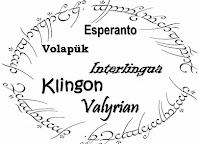Answering questions on the usability of Klingon, I had to do some research. I've already made the confession that I do not speak Kligon at all, and my knowledge of the language doesn't go beyond Qapla. I do enjoy learning languages, but how they sound have a major impact on my motivation to learn them. I am learning a language that sounds awful, but at the moment I need it as I live in a country it is spoken (no, I'm not saying which one). However, I will never be tempted to elarn a language and use it in everyday life if not absolutely necessary if it doesn't resonate with me how it sounds. So, no Klingon in everyday life for me, thank you.
But it is no surprise that Klingon is not a "nice" lanugage. We've heard its father, Dr. Marc Okrand speaking about its creation. It was to sound agressive, guttural and very alien. At the same time, some other languages created for fictious worlds have been designed to sound kind and thus attractive. It is not only Tolkien who created Elvish languages that way, but the language of the N'avi in Avatar was invented with the same intention. I wonder if the original thought of people behind languages was that kind people speak kind languages. Or is it the other way round, and not only in the case of ficious languages? I don't have an answer to this, but if I compare two natural European languages that sound awful to my ears, I tend to say no. In the case of one such languages, the people are kind, helpful and inclusive, and also speak English, so you can avoid figuring out what they are saying in their native language. In the case of the other language, most native spakers I've encountered are rude, exclusive and think a lot about themselves. And guess what, they don't speak English.
Coming back to fictious languages and the colparison between them, what I've found in my research is that Klingon as well as Lord of the Rings, Game of Thrones or Avatar languages all have the absolutely necessary basis for them being used in everyday life: they have a complex and full grammatic structure. I've found different opinions on the extent of their vocabulary, but that is something easy to overcome. My guess is that if there will be a growing fandom of people using these languages, their vocabulary will be further developed to find phrases for phenomena, inventions, issues not part of the fictional culture they were invented for. This is the natural way for languages to develop: if something becomes part of life as a new phenomenon, you need to name it and get the phrase accepted by the population spaking the langages. We see it all the time with new things popping up in our everyday life as a result of the ongoing 4th industrial revolution and sociatal changes.
So, while Klingon is said to be the most developed languages at the moment by many, many other fictious languages have the potential to become languages actually used by people in everyday life. They also sound much nicer, so if English as the de facto common language of the world (and especially science) will ever be replaced, we may look into Elvish lanugages or N'avi





No comments:
Post a Comment